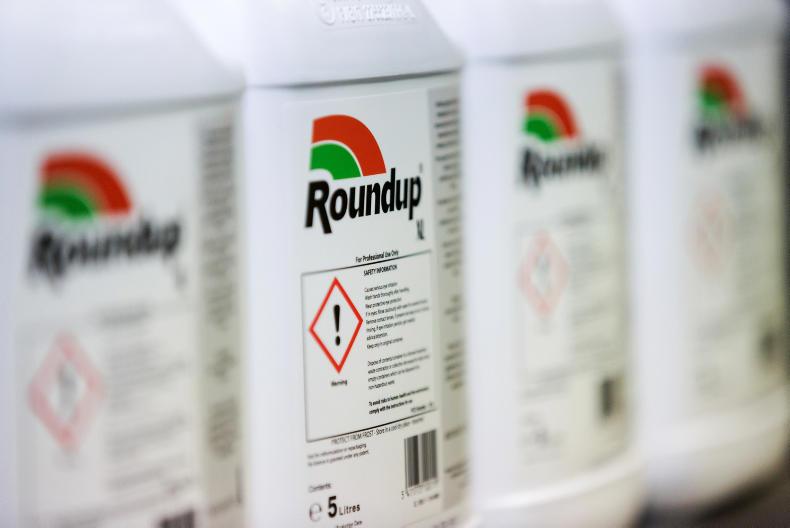The CEO of German chemical manufacturer Bayer has said that the company’s management still retains the backing of its supervisory board.
Werner Baumann made the comments to Frankfurter Allgemeine Sonntagszeitung (FAS) when defending the $63bn acquisition of Monsanto last year.
The company has come under increasing pressure over the suspected links between glyphosate usage and cancer.
Bayer is reportedly facing over 11,000 US cases over its product Roundup and its active ingredient glyphosate.
Bayer’s shares have fallen by one-third over the last 12 months. Despite this, Baumann defended the move to acquire Monsanto, saying it “was and is a good idea”.
Second US ruling
Last week, a second jury in the US state of California determined that Monsanto’s Roundup was the cause of a man’s cancer. In the case of Hardeman v Monsanto, it was found that glyphosate led to Mr Hardeman developing cancer.
The case follows on from the 2018 case where another jury in California ordered $289m in damages to be paid to a groundskeeper. The damages were subsequently reduced to $78m.
Defence
Bayer said it was disappointed with the jury’s initial decision. However, it continued by saying it firmly believed that “science confirms that glyphosate-based herbicides do not cause cancer”.
In 2015, the WHO's International Agency for Research on Cancer concluded that glyphosate is "probably carcinogenic".
However, similar judgments have not been issued by various other bodies.
US EPA
In 2017, a draft risk assessments on glyphosate released by the US environmental protection agency stated:
The draft human health risk assessment concludes that glyphosate is not likely to be carcinogenic to humans. The agency’s assessment found no other meaningful risks to human health when the product is used according to the pesticide label
National Institute of Health 2018 Agricultural Health Study
In a study of 54,251 applicators, 44,932 (82.8%) used glyphosate, including 5,779 incident cancer cases (79.3% of all cases). It was found that glyphosate was not statistically significantly associated with cancer at any site.
In this large, prospective cohort study, no association was apparent between glyphosate and any solid tumours or lymphoid malignancies overall, including NHL and its subtypes
European Food Safety Authority
In a 2017 statement, the European Food Safety Authority stated:
EFSA – in line with the scientific opinion of 27 out of 28 member state experts – concluded that glyphosate is unlikely to be carcinogenic to humans
Health Canada
In a statement in January of this year, Health Canada stated:
No pesticide regulatory authority in the world currently considers glyphosate to be a cancer risk to humans at the levels at which humans are currently exposed
Joint FAO/WHO meeting on pesticide residues (JMPR)
In a 2016 joint meeting of the Food and Agriculture Organisation of the United Nations (FAO) panel of experts on pesticide residues in food and the environment, the World Health Organisation (WHO) core assessment group on pesticide residues (JMPR) stated:
Glyphosate is unlikely to pose a carcinogenic risk to humans from exposure through the diet
Read more
Farm safety: tillage farmer for a day
Decrease in rush spray in drinking water
Second US jury finds Monsanto’s Roundup caused man's cancer
The CEO of German chemical manufacturer Bayer has said that the company’s management still retains the backing of its supervisory board.
Werner Baumann made the comments to Frankfurter Allgemeine Sonntagszeitung (FAS) when defending the $63bn acquisition of Monsanto last year.
The company has come under increasing pressure over the suspected links between glyphosate usage and cancer.
Bayer is reportedly facing over 11,000 US cases over its product Roundup and its active ingredient glyphosate.
Bayer’s shares have fallen by one-third over the last 12 months. Despite this, Baumann defended the move to acquire Monsanto, saying it “was and is a good idea”.
Second US ruling
Last week, a second jury in the US state of California determined that Monsanto’s Roundup was the cause of a man’s cancer. In the case of Hardeman v Monsanto, it was found that glyphosate led to Mr Hardeman developing cancer.
The case follows on from the 2018 case where another jury in California ordered $289m in damages to be paid to a groundskeeper. The damages were subsequently reduced to $78m.
Defence
Bayer said it was disappointed with the jury’s initial decision. However, it continued by saying it firmly believed that “science confirms that glyphosate-based herbicides do not cause cancer”.
In 2015, the WHO's International Agency for Research on Cancer concluded that glyphosate is "probably carcinogenic".
However, similar judgments have not been issued by various other bodies.
US EPA
In 2017, a draft risk assessments on glyphosate released by the US environmental protection agency stated:
The draft human health risk assessment concludes that glyphosate is not likely to be carcinogenic to humans. The agency’s assessment found no other meaningful risks to human health when the product is used according to the pesticide label
National Institute of Health 2018 Agricultural Health Study
In a study of 54,251 applicators, 44,932 (82.8%) used glyphosate, including 5,779 incident cancer cases (79.3% of all cases). It was found that glyphosate was not statistically significantly associated with cancer at any site.
In this large, prospective cohort study, no association was apparent between glyphosate and any solid tumours or lymphoid malignancies overall, including NHL and its subtypes
European Food Safety Authority
In a 2017 statement, the European Food Safety Authority stated:
EFSA – in line with the scientific opinion of 27 out of 28 member state experts – concluded that glyphosate is unlikely to be carcinogenic to humans
Health Canada
In a statement in January of this year, Health Canada stated:
No pesticide regulatory authority in the world currently considers glyphosate to be a cancer risk to humans at the levels at which humans are currently exposed
Joint FAO/WHO meeting on pesticide residues (JMPR)
In a 2016 joint meeting of the Food and Agriculture Organisation of the United Nations (FAO) panel of experts on pesticide residues in food and the environment, the World Health Organisation (WHO) core assessment group on pesticide residues (JMPR) stated:
Glyphosate is unlikely to pose a carcinogenic risk to humans from exposure through the diet
Read more
Farm safety: tillage farmer for a day
Decrease in rush spray in drinking water
Second US jury finds Monsanto’s Roundup caused man's cancer










SHARING OPTIONS